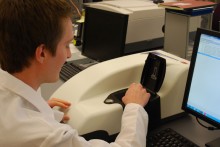Members Login

Channels
Special Offers & Promotions
Lessons in sizing up surface science
 Biomedical engineering and materials science department
finds Malvern Zetasizer Nano performs at every level of teaching and research
Biomedical engineering and materials science department
finds Malvern Zetasizer Nano performs at every level of teaching and research
Associate Professor Albena Ivanisevic and her team in the Department
of Materials Science and Engineering at North Carolina State University (US)
are so pleased with results from the department's Zetasizer Nano particle
characterization system that they have purchased two further instruments for
teaching purposes. Part of the Malvern Instruments materials characterization
portfolio, the Zetasizer Nano light scattering system has a reputation for
ease-of-use, robust performance, and low maintenance, making it the ideal tool
for use in multi-application, multi-user environments and for educating
newcomers in the science of particle characterization. "My students have always had great things to say about the Zetasizer Nano," said Dr Ivanisevic. "They say it's very easy to use. The software is very user-friendly and it can accommodate particles of various different sizes, so I have never had reason to evaluate another particle sizing instrument."
She continued, "What I really like is the ability to look at different size colloids. I will be using the two new instruments with my junior level class in biomedical engineering and materials science. These students will be using the Zetasizer Nano systems to try to figure out which type of colloid is most useful to put onto surfaces for antimicrobial properties."
"Our more senior researchers in the Department of Materials Science and Engineering use the Zetasizer Nano to monitor and analyze how particles change or degrade during our experiments. It is important for us to successfully make batches of particles that are consistently below 10 nanometres. The Zetasizer Nano allows us to get quantitative information on the diameter of particles we're going to utilize for subsequent experiments. We also use it to evaluate the properties of particles following functionalization or changes in the biological medium surrounding them," Dr Ivanisevic explained.
Some of the nanoparticles produced in Albena Ivanisevic's laboratory go on to be used in the construction of interconnective nanowires on semi-conductor surfaces. Her team has also successfully published work covering the use of gold and iron oxide particles to make new constructs with DNA for improved magnetic resonance imaging (MRI). Further information on these projects can be found at: http://www.mse.ncsu.edu/research/ivanisevic/publications
Malvern's Zetasizer series measures: particle and molecular size from below a nanometer up to several micron; zeta potential; electrophoretic mobility; and molecular weight. For further information and to download detailed technical and applications information please go to: www.malvern.com/zetasizer
Media Partners


